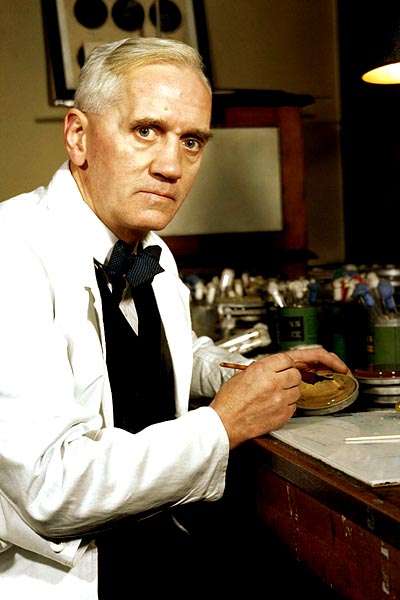 |
| Alexander Fleming, a discover of penicillin (Wikipedia) |
Note: Imagine a world without antibiotics! These simple drugs have saved countless lives by preventing infection.
Get Ready: Have you ever needed an antibiotic? For what? If not, imagine some problems that you might need antibiotics for.
The word "antibiotics" means "against life," which is only a hint at the true purpose of these wonder drugs. For what they do is kill, or at least inhibit the growth of, bacteria and other microorganisms. Antibiotics are used chiefly to prevent infection.
Primitive antibiotics have been around since ancient times. A poultice made with, for example, moldy bread might be applied to a wound to prevent it from festering. There are references to such uses in ancient Egypt, China, Greece, Rome, and other early civilizations.
But the first truly modern antibiotic was developed by a Scottish physician and microbiologist named Alexander Fleming (1881-1955), who in 1928 discovered a substance he called penicillin after the Penicillium mold from which it is derived.
Fleming demonstrated a direct link between an extract of a particular species of Penicillium (there are over 300) and the desired effect of killing a staphylococcus culture. Not only was the preparation highly potent in its effect, but had low toxicity compared to other antiseptics being used at the time.
Fleming's discovery was somewhat amusing. He was always known to have been careless in his laboratory procedures. He had left a petri dish containing a staphylococcus culture out on a table before going on a two-week vacation. When he returned, he noticed that Penicillium mold growing on one of the dishes was preventing the growth of the staphylococci. (A spore of the mold may have floated up from the floor below his in the building, where molds were being studied.)
For years penicillin was used topically. It wasn't until 1940 that its use as a therapeutic agent in fighting bacterial diseases was demonstrated. And the first chemical synthesis of penicillin wasn't completed until 1957, which made widespread use possible.
Today penicillin is the most widely used antibiotic in the world, enabling the treatment of illnesses previously considered life-threatening, including pneumococcal pneumonia and the influenza virus, which had killed as many as 50,000,000 people globally a decade before Fleming's discovery.
--------Read more: https://en.wikipedia.org/wiki/Penicillin
Practice: Match the term to its definition below:
- extract
- festering
- inhibit
- petri dish
- potent
- poultice
- spore
- staphylococcus
- topically
- toxicity
- poisonousness
- a type of bacteria that causes sickness in humans
- applied externally to the body
- something taken out of something else
- slow down; stop
- becoming infected
- a shallow glass container for growing bacteria
- powerful
- a seed-like structure
- a soft, moist mass applied hot as a medicine
Answers are in the first comment below.
Submitted to the Shenzhen Daily for November 10, 2020


Answers to the Practice: 1. d; 2. f; 3. e; 4. g; 5. h; 6. j; 7. i; 8. b; 9. c; 10. a
ReplyDelete